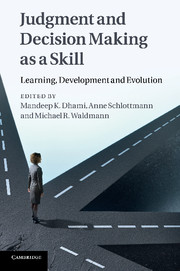Preface
Published online by Cambridge University Press: 05 December 2011
Summary
Preface
Our scientific understanding of human judgment and decision making (JDM) has grown considerably over the past 60 years in terms of the normative benchmarks (or standards) by which we assess performance, the descriptive models we use to describe JDM, and the prescriptive solutions we offer to improve JDM. Indeed, policy and practice in several domains such as education, management, and medicine have benefited from the findings of JDM research. Nevertheless, the vast majority of the theoretical literature and empirical research has discussed human JDM with little reference to its changing or dynamic nature. This is partly due to the historical coincidence that the field of JDM developed in competition with static economic models, such as expected utility theory, and to limiting methodological commitments, such as investigating JDM in single-trial, cross-sectional studies with the primary focus on cognitively fully functioning adults. The contrast to economic models may also have contributed to the fact that the majority of studies have been restricted to collecting behavioral measures, and underweighted the evolutionary and neuropsycho-biological context of JDM. Thus, to date, we know relatively little about how JDM skills are acquired and change within their natural ecological contexts, and how this change is represented in the brain.
There are many important questions that simply cannot be fully answered by prominent, prevailing JDM theories and research methods. For instance, how do we make evolutionarily adaptive decisions? What are the similarities and differences in the decision-making abilities of young children, adolescents, and older adults? How do we learn to make good decisions? How can we improve or aid our decision making? Fortunately, there is an emerging body of work that is interested in long-term and short-term changes in JDM skills that can provide theoretically grounded and empirically supported answers to these questions. Pockets of research have begun to study skill acquisition on a developmental scale in children, adolescents, and the elderly. On an intermediate timeframe, there is research on the acquisition of expertise in JDM, and training and aiding of JDM. Researchers more interested in short-term changes have begun to study learning of JDM tasks. There is also an increasing body of recent work on the evolution and neuropsycho-biology of JDM which provides fascinating new perspectives on the adaptive underpinnings and neural substrates of JDM skills. For a coherent and comprehensive picture of the dynamic nature of JDM in humans these perspectives need to inform each other. Thus, this book brings together leading researchers in the fields of JDM, cognitive development, human learning, and neuroscience to present these emerging perspectives on JDM as a skill.
- Type
- Chapter
- Information
- Judgment and Decision Making as a SkillLearning, Development and Evolution, pp. xii - xiiiPublisher: Cambridge University PressPrint publication year: 2011



